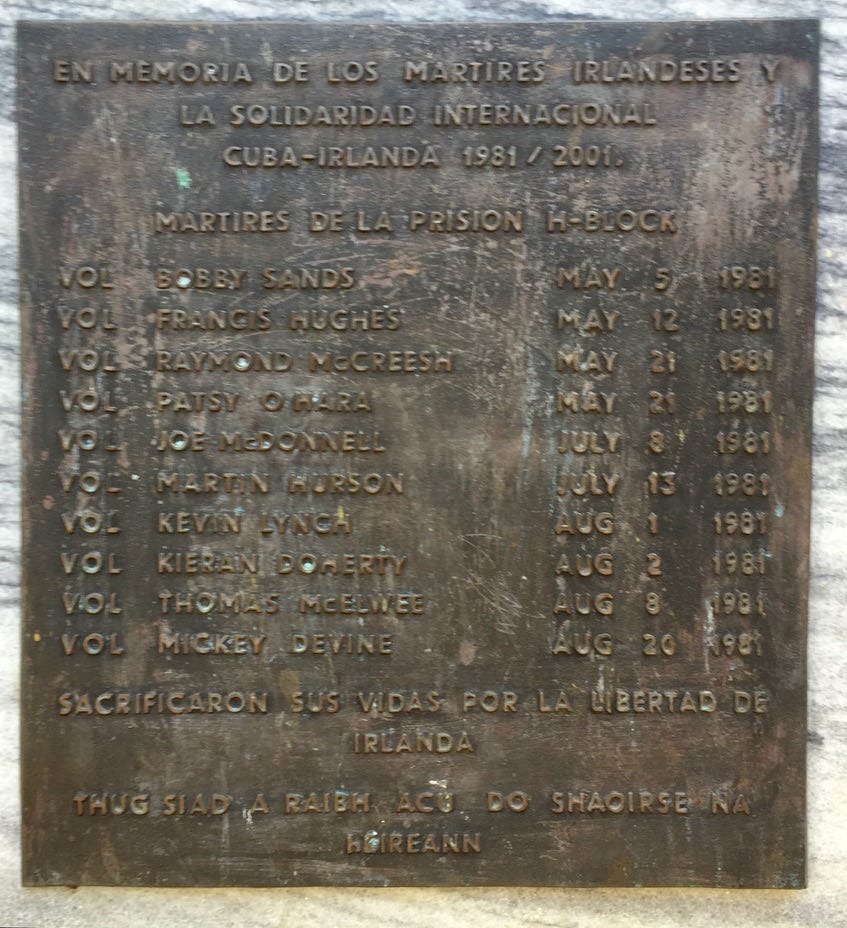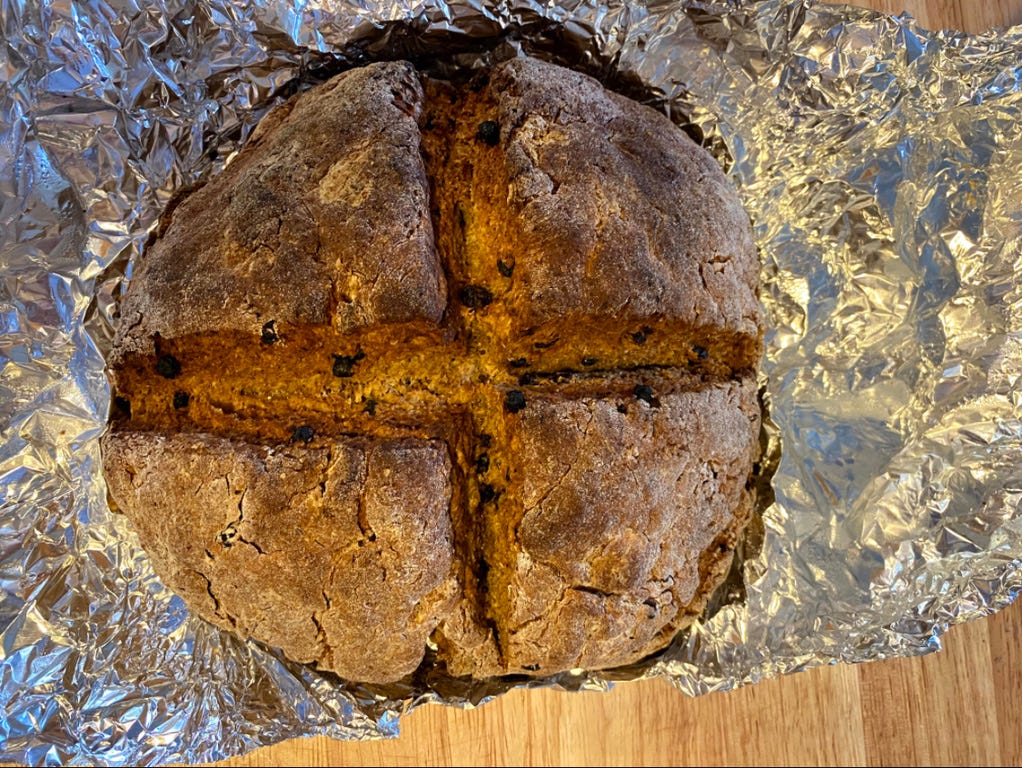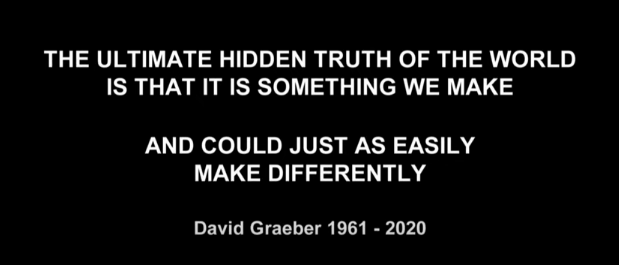Our Demands Most Moderate Are: We Only Want The Earth
When times got tough, there was just about enough
Last year on St. Patrick’s Day, I was home alone just starting to come to terms with what the coming year might be like. I don’t think anyone expected the full scope of what we ended up with, but in hindsight the portents were there for me: my wife and I were stuck more than a thousand miles apart, as we would be for much of 2020; the Bernie Sanders campaign had fallen off a cliff after the thrilling high of winning the Nevada caucuses. All the things I cared most about were out of reach and beyond my ability to change.
In the midst of that deeply self-pitying afternoon I got a text from a friend, Laura, who I hadn’t seen for months. Are you home? If so, remind me which apartment is yours. I stuck my head out the door to find Laura and her roommate Cath in the driveway of my building, bearing a loaf of homemade soda bread.
The pair of them had been some of my first real friends in Seattle; one of my earliest memories of living here is a St. Patrick’s Day keg party that I attended with them. Six years later our celebration of the day was considerably more muted.
We stood in the sun in the driveway talking about how weird things had gotten, the bread warming my hands through its tinfoil wrapper. As if on cue my next door neighbor started yelling at us out her window to stand further apart, for God’s sake.
When they left I retreated inside and re-warmed the bread and smeared butter on one slice, and then another, and then another. It’s dry, filling stuff, sodabread, and I had no business doing that. But in that moment—at a time when I badly needed it—it tasted like being cared for, and a promise that people were still there for each other out there in the world.
This is the spirit that makes me identify most closely with the place my people come from. It is hardly a unique thing to be an American of Irish ancestry; there are six times as many “Plastic Paddies” here in the states as there are people in Ireland. But we cannot choose our heritage, just how we relate to it. And what stands out to me more starkly with each passing year is this manifestation of community—taking care of each other without being asked in uncertain and terrifying times. Those outstretched arms are the foundation of solidarity, a notion I have heard described in one way or another in countless revolutionary Irish songs since childhood.
This solidarity, the songs tell us, is a necessary bulwark against all manner of enemies: colonizing armies, landlords, police. Forced famine, informers, would-be kings. And in the songs this solidarity is forged in two places: in one’s community and in one’s workplace.
Take Derry, flashpoint for so much loss and violence during The Troubles, memorialized in “The Town I Loved So Well”:
In the early morning, the shirt factory horn
Called women from Creggan, the moor and the bog
While their men on the dole played a mother's role
Fed the children and then trained the dogs.
And when times got tough, there was just about enough
But they saw it through without complaining
For deep inside was a burning pride
In the town I loved so well
In the class-conscious Ireland of the 1970s where this violence exploded were echoes of the Easter Rising more than half a century earlier. One of the architects of that 1916 plot to free Ireland from English rule, James Connolly, was a dyed-in-the-wool Marxist and lifelong labor organizer who saw the possibility of Irish nationalism as inextricable from the possibility of Irish socialism.
If you remove the English Army tomorrow and hoist the green flag over Dublin Castle, unless you set about the organization of the Socialist Republic your efforts will be in vain. England will still rule you. She would rule you through her capitalists, through her landlords, through her financiers, through the whole array of commercial and individualist institutions she has planted in this country and watered with the tears of our mothers and the blood of our martyrs.
Connolly was executed by the British for his role in the attempt to wrest independence from their grasp, so badly wounded that he couldn’t stand for the firing squad. That moment—and the ethos of building strength in one’s workplace—are captured here, in Niall Connolly’s “May 12, 1916”:
They carried my wounded father tied him to his final chair,
Said Father Aloysius, for your killer say a prayer,
My father fought for justice, for the workers to be free,
He said I pray for all men who must do their duty
Lily don’t you cry, Lily don’t you cry,
I have lived the fullest of lives
Said my father to the factory girls, your cause is just and right,
It’s a battle we won’t win but a battle we must fight,
When you back hold your head high and sing your song out proud,
That it might echo a hundred years from now
The exploitation of workers in Ireland didn’t end in Connolly’s time, of course; there’s a reason artists like Lorcán Mac Mathúna are still recording versions of his song “We Only Want The Earth” here in the present day:
Some men, faint-hearted, ever seek
Our program to retouch
And will insist, whene’er they speak
That we demand too much
’Tis passing strange, yet I declare
Such statements give me mirth
For our demands most moderate are:
“We only want the Earth.”
“Be moderate,” the trimmers cry
Who dread the tyrants’ thunder
“You ask too much and people fly
From you aghast in wonder.”
’Tis passing strange, for I declare
Such statements give me mirth
For our demands most moderate are:
“We only want the Earth.”Our masters all a godly crew
Whose hearts throb for the poor
Their sympathies assure us, too
If our demands were fewer
Most generous souls! But please observe
What they enjoy from birth
Is all we ever had the nerve
To ask, that is, the Earth
I am in love with this framing: that full control of the world we occupy is a moderate demand, completely reasonable. All of us have spent our lives in a world much different from that one, which makes it sound fanciful, but nothing about human society as it is currently constructed is inevitable. It’s believing that things are mostly as they should be that gets us stuck.
Of course, there is a class of people who have always known that things are not as they should be, that “life’s not fair” is an insult, not a sage bit of advice. Ed Pickford, echoing the words of Connolly, wrote a song about this, appropriately titled “Workers’ Song.” For my money it was sung best by Scots-Irishman Dick Gaughan:
But when the sky darkens and the prospect is war
Who's given a gun and then pushed to the fore
And expected to die for the land of our birth
When we've never owned one handful of earth?We're the first ones to starve, the first ones to die
The first ones in line for that pie-in-the-sky
And always the last when the cream is shared out
For the worker is working when the fat cat's about
It seems crucial that these revolutionary sentiments are twofold, that deep community roots and militant workplace action are inextricable from one another if the world is to be remade.
On the modern Left, here in America, there is something of a growing divide born of a false choice that pits these two pillars against each other. Our labor movement has been so decimated—and intentionally so—that for many people, the idea that democracy or control over your life could come from sustained struggle alongside one’s coworkers is completely foreign. People have become skeptical of institutions and organizations and all their imperfections, and rightly so; however, the quickly-radicalized have taken things a step further and decided that those institutions and organizations are fully compromised and must not just be ignored, but scorned.

There has concurrently been a lot of talk in the past year about radically reimagining communities. That within us is all we need, that we can take care of each other, and in doing so subvert the repressive power of the state. But I think about recent moments like the Texas blackouts and through them see the massive flaws in that logic. Mutual aid networks—these reimaginings of a nurturing community here in our atomized nation—can provide some of the food and blankets and clean water to help people endure in the aftermath of tragedy, and should be praised vociferously for the good work they do to that end. But it’s only control of the state itself, in the hands of regular working people, that can lead us to build power grids that serve everyone. Mutual aid networks can distribute Narcan and tents and blankets to our neighbors experiencing homelessness, which is beautiful and admirable work. But it’s only control of the state itself that can lead us to build public housing and fund healthcare.
Community is necessary to gain the strength to fight. But we won’t change anything permanently and we’ll never be a real threat unless we can hit them in the wallet, at the source of economic production. And the only way to hit them in the wallet is to get organized at work, and to support others who also seek to do so.
James Connolly knew this. So did Mother Jones and Bobby Sands and the other revolutionary luminaries from that small island where so many of us find our roots. It’s those lessons I want to carry with me today, and in all my days to come.
Thanks, as always, for reading. I’ll talk to you next week.
-Chuck
PS - If you liked what you read here, why not subscribe and get this newsletter delivered to your inbox each week? It’s free and always will be.
PPS - I’m bringing Laura and Cath some homemade Shepherd’s Pie later to say thank you. Don’t tell them.







